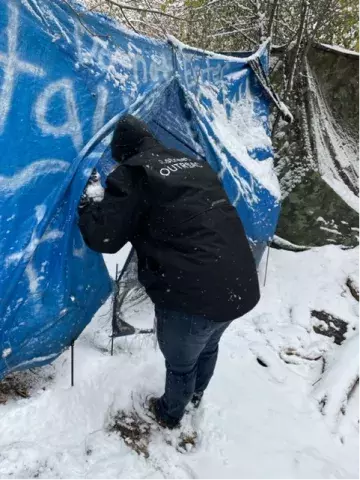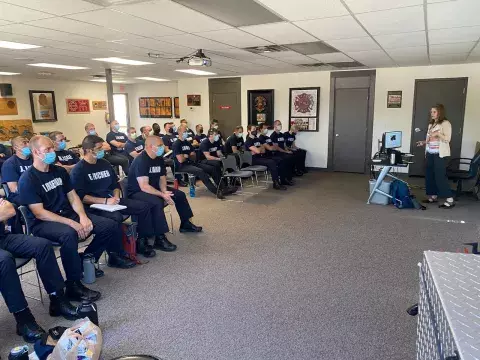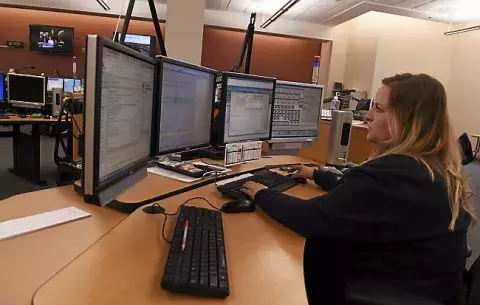About Community-First Response
In case of fire, violence or other immediate danger, you can always count on Saint Paul police officers, firefighters, and emergency medical responders. But more than half of all 911 calls in Ramsey County, which provides Saint Paul’s emergency dispatch service, are non-life-threatening emergencies. In those more common situations, sirens and flashing lights aren't always the right solution.
In collaboration with Saint Paul communities, the city is investing in an additional way to help when people are in trouble — what we call community-first response.
Community-First Response Dashboard
Learn more about the impact of our Community-First Response framework. Visit our dashboard for information on the framwork's history, principles, and partnerships, along with data on its impact to date.
Saint Paul's Community-First Responders

To reduce the potential for harm to Saint Paul residents and provide the best possible care for all our neighbors, the City is investing in special new units of trained professionals to handle urgent problems that don’t involve weapons or violence — our community-first response teams, coordinated by the Office of Neighborhood Safety. These teams coordinate their work every day, and their leaders meet every week to improve the service they provide.
Community Alternative Response Emergency Services (CARES)
The Saint Paul Fire Department’s Community Alternative Response Emergency Services (CARES) Team is a mobile crisis response unit. The team pairs an EMT with a Licensed Clinical Social Worker, and responds to calls involving mental health crisis, behavioral emergencies and non-emergency medical needs. Eventually, we’ll move them to a co-responder model.
Homeless Assistance Response Team (HART)
The Department of Safety and Inspection's Homeless Assistance Response Team (HART) responds to people who don’t have a safe place to live. As part of the City’s comprehensive response to the ongoing housing crisis, the HART Team supports people who are living outdoors in Saint Paul. Outreach workers connect people with health and housing services and provide personal support and referrals.
Project PEACE (Prevention/Intervention, Environmental Design, Accountability/Outreach, Community Action, and Enforcement)
Project PEACE is leading the response to end gun violence. Designed over months of collaboration with Saint Paul neighbors, Project PEACE unites community leaders, community first responders, social service providers and more to build a community of support and care around people who have been involved in gun violence — making future violence less likely.
How Saint Paul Emergency Responders are Trained

Compassionate, trauma-informed and culturally appropriate response training
In the future, specially trained community-first response teams will respond to all calls for help in Saint Paul that don’t involve weapons or violence, allowing emergency first responders to get to life-threatening emergencies more quickly. Today, we are still working toward that goal — and in most cases, emergency first responders will respond to even non-emergency calls for help.
For that reason, every single emergency first responder in Saint Paul — every police officer, firefighter, and emergency medic — receives specific training in compassionate, trauma-informed and culturally appropriate response to people who are in crisis.
Because law enforcement officers have a special duty to protect us and our neighbors, the Saint Paul Police Department proudly publishes its use-of-force reports and policies for the public, trains officers in advanced de-escalation techniques, and prides itself on a long-standing culture of humanity and respect for everyone. As community members on the 2021 Saint Paul Public Safety Commission reported, “The Saint Paul Police Department is highly regarded among police departments and has already adopted many promising practices.”
As our city invests in special community-first response teams, you can feel confident that the people who respond will be trained to help you in the best possible way — not only in the future, but right now.
What To Do When You're Concerned About Someone in Saint Paul
Saint Paul residents are caring people, and sometimes we need help when someone in our neighborhood is having trouble. Whenever you call for help, the city and our partners will work with you to achieve the best possible result for everyone — not just to resolve the current crisis, but also to identify and remedy the underlying causes.
Here’s what to do in some common situations (when in doubt, call 911 – here’s what to expect when you call).
What Happens When I Call 911?

When you call or text 911 in Saint Paul, a trained operator at the Ramsey County Emergency Communications Center will answer within seconds. (Text messages sometimes take longer to answer.) If you are calling from a cell phone, it may take a few seconds before you hear the phone ringing — that’s because your cell phone company takes a moment to locate the right 911 agency for your location.
If you speak a language other than English, say the name of the language you want to speak and the operator will bring an interpreter into the conversation.
The 911 operator and dispatcher are your partners in resolving the crisis.
- Operators are trained to listen closely to your tone of voice and the words you use to decide on the best kind of help to send. If there isn’t an immediate threat of violence or weapons, make sure to say so, because the operator will send a police officer if there is. No matter what, try to answer as calmly and clearly as you can.
- If the operator decides you need immediate assistance, they will bring a dispatcher into the conversation to send you the help you need. The dispatcher is your partner too. They may ask you some of the same questions over again, just to make sure they understand your situation. At that point, the dispatcher will send the best possible response — some combination of police officers, firefighters, emergency medics, or trained civilian care providers.
- Because the majority of 911 calls in Ramsey County don’t require a traditional emergency response, Saint Paul and our government and community partners are investing in more civilian care providers. These community-first responders have specialized training and expertise to help people who are in crisis — and when they can help in less urgent cases, Saint Paul emergency responders can respond more quickly to emergencies citywide. Learn more about what’s changing.
How Saint Paul is Improving Our Response to Calls for Help
In 2021, the community members on Saint Paul’s Community-First Public Safety Commission recommended a new approach to non-emergency crisis situations, based on evidence about what truly keeps communities safe. Mayor Carter immediately directed city leadership to implement the commission’s recommendations. That work is ongoing across city departments, in partnership with Ramsey County, other local governments, and community members from across our neighborhoods.
Here’s how Saint Paul used to respond to non-emergency crisis calls, how we’re taking action now, and the improvements you can expect as we make progress.
Before 2020: Emergency Response
- 911 dispatched Saint Paul firefighters, EMTs, or police officers to non-emergency calls.
- This sometimes resulted in long wait times for requests for help that didn’t involve immediate danger — and sirens and flashing lights sometimes escalated the situation for people in crisis.
Today: Emergency Response with Follow-up
- 911 dispatches Saint Paul firefighters, EMTs, or police officers to non-emergency calls.
- In coordination with the city’s community-first response teams, emergency responders will connect people on the scene with follow-up support and connections to resources.
Late 2023: Community First Response Expansion (based on funding and recruitment)
- 911 dispatches Saint Paul firefighters, EMTs, or police officers to non-emergency calls.
- During select daytime hours, pilot community-first response teams will accompany the emergency responders when they are available.
- On the scene or soon afterward, community first responders will connect people who need help to follow-up care.
Future: Dedicated Community-First Response with Support
- 911 dispatches community-first response teams to non-emergency calls, including specially trained EMTs and social workers. Police officers may come along if necessary for safety, but they will stay in the background.
- On the scene or soon afterward, community-first responders will connect people who need help to follow-up care.